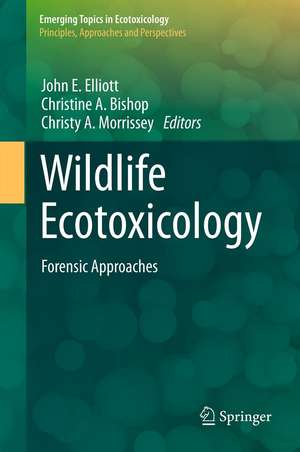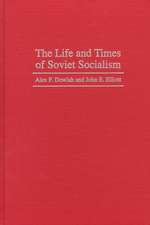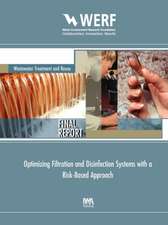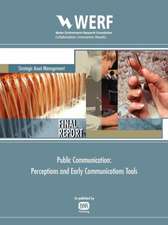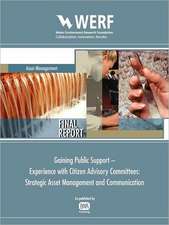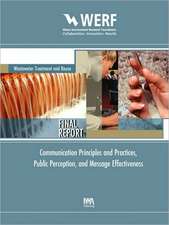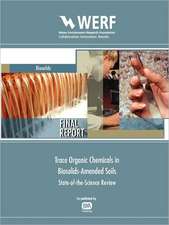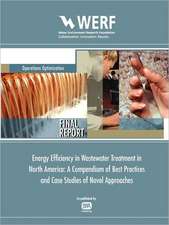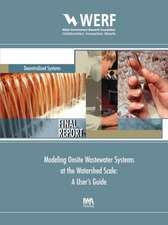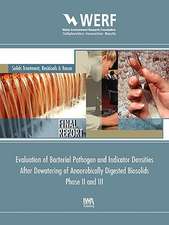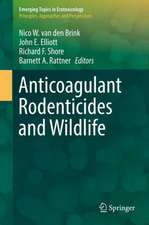Wildlife Ecotoxicology: Forensic Approaches: Emerging Topics in Ecotoxicology, cartea 3
Editat de John E. Elliott, Christine A. Bishop, Christy Morrisseyen Limba Engleză Paperback – 25 oct 2013
| Toate formatele și edițiile | Preț | Express |
|---|---|---|
| Paperback (1) | 1007.97 lei 6-8 săpt. | |
| Springer – 25 oct 2013 | 1007.97 lei 6-8 săpt. | |
| Hardback (1) | 1228.29 lei 6-8 săpt. | |
| Springer – 30 aug 2011 | 1228.29 lei 6-8 săpt. |
Preț: 1007.97 lei
Preț vechi: 1229.24 lei
-18% Nou
Puncte Express: 1512
Preț estimativ în valută:
192.94€ • 209.64$ • 162.17£
192.94€ • 209.64$ • 162.17£
Carte tipărită la comandă
Livrare economică 21 aprilie-05 mai
Preluare comenzi: 021 569.72.76
Specificații
ISBN-13: 9781461429654
ISBN-10: 146142965X
Pagini: 488
Ilustrații: XX, 468 p.
Dimensiuni: 155 x 235 x 26 mm
Greutate: 0.68 kg
Ediția:2011
Editura: Springer
Colecția Springer
Seria Emerging Topics in Ecotoxicology
Locul publicării:New York, NY, United States
ISBN-10: 146142965X
Pagini: 488
Ilustrații: XX, 468 p.
Dimensiuni: 155 x 235 x 26 mm
Greutate: 0.68 kg
Ediția:2011
Editura: Springer
Colecția Springer
Seria Emerging Topics in Ecotoxicology
Locul publicării:New York, NY, United States
Public țintă
ResearchCuprins
Introduction.- Ethics in science and regulation of environmental chemicals.- Update: DDT, bird populations, chemical regulation, California coast.- Dieldrin, poisoning and population decline of British birds of prey.- The Rocky Mountain Arsenal: Contamination and enduring impacts on wildlife.- North American Great Lakes: Contaminant impacts on birds, regulations.- Dioxins, pulp and paper, fish-eating birds on the Pacific coast of Canada.- Getting the lead out: Dead ducks, eagles and the hunting community.- Mercury and impacts on bird populations.- Insecticides, scavenging birds and regulations in the Fraser River Delta.- Death on the Pampas: Grasshoppers, methamidofos and hawks.- Atrazine and amphibians.- Arsenic and old trees: pine beetles, wood peckers in British Columbia.- Diclofenac: Sacred cows and vulture culture.- Glyphosate and frog societies: Can they coexist?- Biotoxins, invasive species, birds and degraded ecosystems.
Recenzii
From the reviews:
“This volume illustrates many applications of wildlife ecotoxicology to environmental policy and litigation. It describes detectives exploring toxicologic causes of the morbidity and mortality of individual organisms and declines of wildlife populations. … Summing Up: Recommended. Upper-division undergraduates through professionals; informed general readers.” (J. Burger, Choice, Vol. 49 (9), May, 2012)
“Wildlife Ecotoxicology might look like heavy going but is actually much more accessible than most collections of research papers. … Stories are told, both environmental and human, that should open up the subject to a broader audience. … By bringing both the peregrine falcon and vulture stories together, we get a real sense of how the field has changed over the last 50 years and appreciate the ongoing need for dedicated ecotoxicologists. Highly recommended.” (Ian Powell, The Biologist, Vol. 59 (4), October, 2012)
“This book presents 13 examples of investigations of either the effects of single chemicals or site contamination on wildlife (ecological risk assessments) or of the causes of observed effects (ecological causal assessments). … This book will be interesting to professional ecotoxicologists who are likely to know of many of these cases and some of the participants. It would be an excellent adjunct to conventional ecotoxicology texts in graduate programs.” (Glenn Suter, Integrated Environmental Assessment and Management, Vol. 8 (2), January, 2012)
“This volume illustrates many applications of wildlife ecotoxicology to environmental policy and litigation. It describes detectives exploring toxicologic causes of the morbidity and mortality of individual organisms and declines of wildlife populations. … Summing Up: Recommended. Upper-division undergraduates through professionals; informed general readers.” (J. Burger, Choice, Vol. 49 (9), May, 2012)
“Wildlife Ecotoxicology might look like heavy going but is actually much more accessible than most collections of research papers. … Stories are told, both environmental and human, that should open up the subject to a broader audience. … By bringing both the peregrine falcon and vulture stories together, we get a real sense of how the field has changed over the last 50 years and appreciate the ongoing need for dedicated ecotoxicologists. Highly recommended.” (Ian Powell, The Biologist, Vol. 59 (4), October, 2012)
“This book presents 13 examples of investigations of either the effects of single chemicals or site contamination on wildlife (ecological risk assessments) or of the causes of observed effects (ecological causal assessments). … This book will be interesting to professional ecotoxicologists who are likely to know of many of these cases and some of the participants. It would be an excellent adjunct to conventional ecotoxicology texts in graduate programs.” (Glenn Suter, Integrated Environmental Assessment and Management, Vol. 8 (2), January, 2012)
Textul de pe ultima copertă
Many books have now been published in the broad field of environmental toxicology. However, to date, none of have presented the often fascinating stories of the wildlife science, and the steps along the way from discovery of problems caused by environmental pollutants to the regulatory and nonregulatory efforts to address the issues. This book provides case by case examinations of how toxic chemical effects on wildlife have brought about policy and regulatory decisions, and positive changes in environmental conditions. Wild animal stories, whether they are about the disappearance of charismatic top predators, or of grossly deformed embryos or frogs, provide powerful symbols that can and have captured the public's imagination and have resulted in increased awareness by decision makers. It is the intent of this book to present factual and balanced overviews and summaries of the science and the subsequent regulatory processes that followed to effect change (or not). A variety of chemicals and topics are covered, from the impact of legacy pollutants such as dioxins and PCBs in birds to controversial issues of herbicides and amphbians, and the recent case of the veterinarian pharmaceutical that has brought three species of Asian vultures to the brink of extinction. Researchers, regulators, educators, NGOs and the general public will find valuable insights into the processes and mechanisms involved both in environmental scientific investigation and in efforts to effect positive change.
Caracteristici
Investigates the cause and effect relationships between environmental toxicants and vertebrate wildlife populations Forensic toxicology is an important part of that field and focuses on identifying injury or death caused by poisoning The implications of the choices made in environmental policy and regulatory decisions cannot be overstated Includes supplementary material: sn.pub/extras
